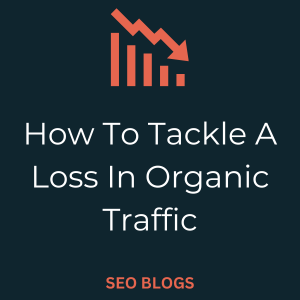If you have experienced a loss in organic traffic, it can be a worrying and frustrating challenge. Whether your website is for a personal blog or a large e-commerce site, a drop in organic traffic can potentially mean a drop in rankings and can affect your visibility, engagement, conversions and ultimately your revenue. If you have noticed a drop in your organic traffic, don’t panic as there are steps you can take to find out what has happened and how you can recover your rankings and traffic in order to increase conversions.
In this blog, we will discuss why your organic traffic could have taken a drop, how to identify the cause and actions you can take to regain your traffic.
Initial Analysis
Understanding the causes behind your drop in traffic is essential in order to know how to address these causes, so the first step if you have noticed a drop in organic traffic is to conduct an initial analysis.
Use tools such as Ahrefs, SEMrush, Google Analytics and Google Search Console to review traffic decreases – you can identify which pages of your website have been affected and look at specific dates to see if you can find any information about a potential cause.
There can be many potential reasons as to why you’re organic traffic has dropped including:
- ➡️ Google algorithm updates – Google releases hundreds of search algorithm updates every year. While some are minor, some core updates can significantly affect search rankings. These updates can impact how Google evaluates website content and ranks pages and if your website is not providing the most helpful and relevant content, you may experience a loss in traffic.
- ➡️ Technical SEO problems – technical issues can prevent Google and other search engines from properly crawling and indexing your pages which can in turn affect your rankings, visibility and traffic. If Google cannot effectively crawl your website, it may not be able to index it and it therefore won’t appear in the SERPs.
- ➡️ Content issues – personally, I would say that content is the backbone of SEO and it is a huge part of SEO overall. If your content is outdated, irrelevant or thin, it is likely that it won’t rank highly and you can lose out on a lot of potential organic traffic.
- ➡️ Competition – another reason you may lose traffic is simply because your competitors are actively improving their SEO strategies. If a competitor has updated their content, built backlinks and are providing optimised content, they may increase their rankings and could push your content further down the page, potentially reducing clicks and traffic.
- ➡️ SERP intent change – SERP intent is vital when it comes to optimising your website – it is so important that your website is giving the users what they want. This means that if the user intent changes, and your website is not providing users with the information they are looking for, you’ll probably lose rankings so that Google can provide users with the most helpful and relevant content.
How To Figure Out The Cause Of Your Traffic Loss
There are many ways in which you can figure out the causes of your traffic loss:
Google Search Console
- ➡️ Analyse the performance report to understand which pages have experienced traffic drops.
- ➡️ Review the search results report to analyse which search queries are bringing in traffic and which queries have dropped off.
- ➡️ Analyse the page indexing report to look through any crawl errors and any technical issues that could be preventing Google from crawling and indexing your site.
- ➡️ Utilise the page experience report to ensure your website is providing a good page experience.
Google Analytics
- ➡️ Identify which pages have seen the biggest traffic drop off in the user acquisition report – comparing current data to historical data is a good idea to see what has dropped off. If it is applicable, make sure to factor in seasonality.
- ➡️ Look at the highest revenue driving pages to uncover which pages are having the biggest impact due to the loss in organic traffic.
- ➡️ Analyse user behaviour metrics such as engaged sessions, engagement rate, engagement time and bounce rate to see if there are engagement issues on particular landing pages.
Ahrefs
- ➡️ Review which pages have seen decreases in rankings for specific keywords.
- ➡️ Check keyword volumes to analyse any trends or decreases.
- ➡️ Look into search intent for target keywords and review whether or not your landing pages are matching the intent.
- ➡️ Analyse your backlink profile against competitors.
- ➡️ Review how competitors are ranking for target keywords and if they have seen similar decreases or increases.
Algorithm Updates
- ➡️ Research whether there have been any algorithm updates – check what these updates were regarding and align the dates of the update with your loss to see if you have been impacted.
Review Website Changes
- ➡️ Identify any recent website changes; content, design, or technical to see if there are any issues with these changes or if these could have negatively impacted your SEO performance.
- ➡️ Check your robots.txt file and sitemap to ensure there are no issues.
Conduct A Competitor Analysis
- ➡️ Analyse your competitors’ sites to see if they have made any significant changes that could be impacting your rankings.
- ➡️ Check their content, backlink and on-page efforts to see if they are actively updating and refreshing their website for SEO purposes.
Ways To Increase Organic Traffic
Once you have identified the cause of your traffic drop, you can now start to take actionable steps to improve your rankings and traffic so that you can increase conversions and revenue.
Technical SEO
Start by addressing any technical issues that could be preventing your site from being crawled and indexing. There are many different technical fixes but below are some of the key areas to ensure they are working correctly and are optimised for SEO.
- ➡️ Crawl Errors
Use Google Search Console to identify crawl errors and ensure you fix all issues that are preventing Google from crawling your site. Errors such as 404, page not found or any other 4xx issues should be resolved to ensure Google can crawl your website correctly.
- ➡️ Indexing Errors
It is important to make sure that Google is indexing all of the important pages from your site so firstly, review your sitemap to ensure that there are no errors and all necessary pages are included. Secondly, review your robots.txt file and make sure there are only pages that shouldn’t be indexed in there. If there are urls in your robot.txt file that you want to be indexed, make sure to remove these and optimise them for search engines.
- ➡️ Site Speed
Site speed is important for user experience and search engines so optimising it is highly recommended. Using PageSpeed insights, you can assess your site speed and look for areas for improvement. Consider compressing images and minimising JavaScript to improve page loading times.
- ➡️ Mobile Friendliness
Google uses mobile-first indexing, and with the majority of users using their mobile device to conduct searches, it is extremely important that your website is mobile friendly. Make sure to check that your site is responsive on all devices and make sure to make any necessary improvements – you can use Google’s Mobile-Friendly Test to check your website’s mobile usability and from there, you can see if you need to make any changes to your site.
Content
Once you have identified areas of your website that have seen a decrease in traffic, you can update your content accordingly. Outdated and thin content can cause traffic losses over time as they are not providing users with helpful information, so it is important that you are regularly updating your content to ensure it is satisfying the user intent by staying relevant and providing informative content.
To update your content, you should conduct a content audit to evaluate the quality of your content and identify which pages are a priority to update. When updating your content, ensure to carry out the following steps:
- ➡️ Keyword research
- ➡️ Content updates
- ➡️ Internal Linking
It is important to make sure your content is relevant, unique and helpful to users. By improving your content you can increase rankings and engagement and recover lost traffic.
Backlinks
Backlinks are an essential part of any SEO strategy and a high quality backlink profile can have a large impact on your website’s organic rankings. A drop in the quality of backlinks to your site can therefore have a large impact on your organic traffic. Focus on acquiring high-quality backlinks from authoritative sites to improve the quality of your backlink profile. Continuously work on strengthening your backlinks by creating high quality Digital PR campaigns and by creating high quality content that can naturally attract links. Gaining high quality backlinks can increase the authority of your site and can have great impacts on your SEO performance.
User Experience
User experience is highly important when it comes to engagement, so make sure you are optimising your site for your users first. Google’s primary goal is to help users, so optimising your site for your users is therefore essential. When improving user experience, make sure to optimise the following:
- ➡️ Meta title and description
- ➡️ Readability
- ➡️ Design elements
- ➡️ Navigation
- ➡️ Engagement
- ➡️ CRO analysis
By creating a good user experience throughout your site, you can improve engagement and conversion rates.
Optimising Your Site For SEO
The above information can be extremely helpful if you have experienced a drop in organic traffic. However, the main thing to remember is to make sure your SEO strategy is ongoing. Focus on creating high quality content, ensuring your website is in good technical stance, conducting regular audits and keeping up to date with industry news and updates. This will allow you to proactively stop your traffic from decreasing in the first place.
By staying informed, you can make sure your website is optimised at all times and adapt your SEO strategy accordingly.
Experiencing a drop in traffic can be difficult but by navigating it carefully and carefully analysing what has happened and how you can fix it, you can work to regain any lost traffic.
If you have noticed a loss in your organic traffic and you need help understanding what has happened and how to regain this traffic, make sure to get in touch with our team of SEO experts. We can help you create a targeted SEO strategy and increase your organic traffic in order to meet the goals of your business, whether that be engagement, conversions, or revenue – we can help.

